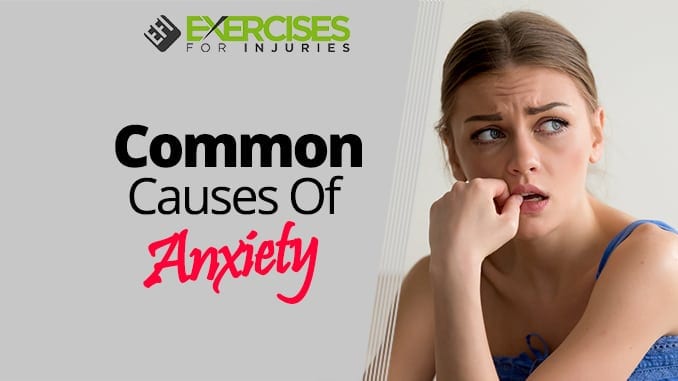
It’s normal for everyone to feel anxious once in a while. However, in some people anxiety becomes overwhelming. When nervousness affects your work, school, or interpersonal relationships, you might need help. Did you know what you worry about changes with age? Do you know what worries people even more than dying? Let’s look at the most common causes of anxiety and what you can do to feel calmer.

What’s The Difference Between Being Anxious And An Anxiety Disorder?
Let’s say you have an important meeting or maybe you’re about to start an important race you’ve been training for. In these cases, it’s normal to feel somewhat anxious.
An anxiety disorder, on the other hand, is a medical diagnosis. Anxiety disorders are the most common mental health problem in the United States, affecting 40 million adults. At any time 18.1 percent of the population suffers from an anxiety disorder.
What Are Anxiety Disorders?
The medical definition of anxiety disorders divides the problem into several different categories.
For adults, these are:
1. Agoraphobia
Fear of places or situations that might make you feel panic, trapped, helpless or embarrassed.
2. Anxiety Disorder Due To A Medical Condition
Caused by a specific medical problem, like an overactive thyroid gland.
3. Generalized Anxiety Disorder
You are very anxious and worried about everyday life activities; the anxiety is out of proportion, and also you can’t control it.
4. Panic Disorder
You have episodes of very strong anxiety, fear, or terror that peak quickly. Symptoms indeed include a feeling of impending doom, shortness of breath, chest pressure, or a racing heart, and you might worry that panic attacks will happen again.
5. Social Anxiety Disorder (Social Phobia)
You are afraid of and avoid social situations due to embarrassment, feeling self-conscious, or worry about being judged.
6. Phobias
You feel very anxious or afraid when exposed to a specific object or situation; you may even panic, and you try to avoid these things.
7. Substance-Induced Anxiety Disorder
Related to drug abuse, medications, toxins, or drug withdrawal.
Other anxiety disorders might not meet the characteristics above. Still, your symptoms are severe enough to disrupt your life.
What Are The Common Causes of Anxiety Disorders?
While there is no single Common Causes Of Anxiety, there are certain factors that may be important. For example, some medical conditions can be associated with anxiety.
These are:
- Heart disease
- Diabetes
- Overactive thyroid (hyperthyroidism)
- Lung problems like emphysema or chronic obstructive pulmonary disease (COPD) and asthma
- Drug and alcohol abuse or withdrawal
- Withdrawal from anti-anxiety medications (benzodiazepines)
- Chronic pain or irritable bowel syndrome
- Rare tumors that make “fight-or-flight” hormones
Other factors might increase your risk of anxiety while they might not be the actual cause, such as:
1. Trauma
A history of abuse or trauma or witnessing a traumatic event.
2. Health Problems
Having an illness can increase worry and is one of the Common Causes Of Anxiety.
3. Stressful Life Moments
A big event or stressful situation may lead to increased anxiety.
4. Personality
Some personality types are more likely to be anxious.
5. Other Mental Health Issues
Conditions like depression may be associated with anxiety.
6. Family History
Anxiety disorders can run in families.
7. Drugs Or Alcohol
Abuse or withdrawal can cause anxiety.
What Do We Worry About?
Even though general life stress may not lead to a full-fledged anxiety disorder, managing worry helps keep you calm. Still, different age groups worry about different things. For example, students typically worry about relationships, work, money, not being sure about their future, and lack of confidence.
As a population ages, these worries persist, but health also becomes one of the top worries. The interesting thing is that worry tends to decline as you age unless you have a diagnosable mental health condition.
Moreover, studies even look at where people worry. Most do it at home, and — you guessed it — we worry in our bedrooms. Even the timing of most of our worry was clocked at between 9 p.m. and 3 a.m. This indeed comes as no surprise to anyone who has tossed and turned all night long worrying.
Do People With Anxiety Disorders Worry About Different Things?
The quick answer to this is no as people who suffer from anxiety disorders worry about the same things as everyone else. The difference is in the intensity and duration of the worry. When the anxiety begins to interfere with work, relationships, school, and life, then it’s probably time to get professional help.
There are some instances when Common Causes Of Anxiety are much different than the usual worries we have. For instance, phobias may be unreasonable fears of everyday objects or places.
What Do People Fear Most?
Many polls appear every year cataloging what people fear. The results can also range anywhere from corrupt government to terrorism to economic collapse. There is also one issue that strikes a deep fear in almost everyone, and it isn’t the fear of death.
However, before that, here are many common fears that people name in various polls:
- Corrupt government
- Terrorist attacks
- Not having enough money for the future
- Loved ones dying or getting ill
- Economic or financial collapse
- Identity theft
- The Affordable Health Care Act/”Obamacare”
- Natural disasters
Now, death itself is also high on the list of fears, especially for older adults. Still, the number one fear, especially as we get older, is the loss of autonomy. This could mean getting your driver’s license taken away, losing your mobility, or also getting admitted to a nursing home. The loss of independence is indeed frightening to almost everyone.
How To Manage Worry And Anxiety
One of the most helpful things to understand about anxiety is that you are not alone. Millions indeed suffer from anxiety disorders. The number of people who are anxious, but don’t have a disorder, probably numbers in the hundreds of millions.
Here are some of the best tips for getting a handle on your anxiety:
1. You’re Already Doing It
Just reading about it and educating yourself helps you manage any problem better. There are a ton of sites out there but try to look for ones run by professionals in mental health. The more you understand about the problem, the better equipped you are to handle it.
Moreover, consider online anxiety forum sites too. These are also places where everyday people with similar problems share their experiences. You might find a good doctor or coping mechanisms that work wonders. In any case, you’ll at least know that others are out there living with their fears just like you.
2. Exercise
Exercise is great for relieving anxiety. Before you jump to the next suggestion, however, think about this. You could end up seeing a bunch of doctors, taking pills, and seeing a therapist for years. That’s a lot of time and energy spent.
Moreover, what if you pivot the focus of your mind to get serious about exercise? You might also avoid a lot of pain. Exercise naturally releases hormones | 404 that make you feel good. This is way cheaper and safer than any pharmaceutical product.
3. Sleep Healthy
Lack of rest magnifies any stressful situation. The right amount varies, but around seven to eight hours per night seems best.
If you’re having trouble sleeping, try these tactics:
-
- No coffee, tea, caffeinated or sugary drinks at night
- Go to bed at the same time every night
- Get up at the same time every morning
- If you can’t sleep, get out of bed and read until you feel sleepy again
- Do not use electronic devices in bed as the light disrupts sleep patterns
- Make sure your bedroom is completely dark when you sleep
- Consider using a “white noise” maker while sleeping as this can cancel out other noise that keeps you awake
These are steps to achieve good sleep hygiene. This indeed means your sleep is more ordered and more restful.
4. Get Spiritual
Getting connected with your spiritual side can have incredible benefits. Consider meditation and prayer to help reduce anxious thoughts. It might be difficult at first since your mind is racing. However, keep at it.
At first, let your mind race and let your thoughts unwind. Letting this happen in a quiet place might be what you need to begin to get free of anxiety. In many cases, running around busy all the time doesn’t let you process thoughts and feelings. This generates anxiety.
Furthermore, you can start by setting aside 15 minutes every day or every other day for meditation. There are even apps online that can help you. Make sure you choose one that matches your choice of religion. If you mix things up too much, you might cause yourself more anxiety.
5. Get Help
If you feel like things are really out of control, talk to a professional mental health expert. In some cases, you may even need medication. The point is you don’t have to suffer alone. However, don’t stop there. Talk to a trusted friend or family member as well. Find someone who will help you understand — and overcome — your fears.
For your guide to the best foods to heal your body, check out The Best Foods that Rapidly Slim & Heal in 7 Days, here!



